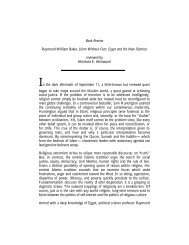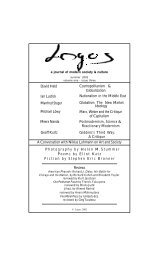Michael J. Thompson Stephen Eric Bronner Wadood Hamad - Logos
Michael J. Thompson Stephen Eric Bronner Wadood Hamad - Logos
Michael J. Thompson Stephen Eric Bronner Wadood Hamad - Logos
Create successful ePaper yourself
Turn your PDF publications into a flip-book with our unique Google optimized e-Paper software.
Diana Judd<br />
of his schema is a nearly random flitting from topic to topic, his thoughts<br />
never alighting long enough to explore any one of them in useful detail.<br />
Gray’s book contains many inconsistencies and contradictions. Among the<br />
most egregious is his treatment of science. On the one hand, Gray states that<br />
“the origins of science are not in rational inquiry but in faith, magic and<br />
trickery,” while on the other hand he equates science with technology, from<br />
which, according to Gray, its power flows. While he does not go so far as to<br />
declare that technology is trickery or magic, the implication is clear.<br />
Furthermore, his stance that the origins of science lie in magic and trickery<br />
while its success lies in superior rhetoric betrays a fundamental<br />
misunderstanding of the history and philosophy of science. It is rather<br />
surprising that a professor of European Thought at the London School of<br />
Economics would so thoroughly neglect both Francis Bacon and Rene<br />
Descartes.<br />
Another inconsistency lies in Gray’s extensive usage of quotations from both<br />
western and eastern philosophy to buttress his argument that philosophy is so<br />
much bunk obscuring the truth about humanity. In addition, he continually<br />
references Darwin (without once explaining the actual theory of evolution)<br />
and recent advances in genetic research to illustrate his point that humans are<br />
merely animals and should consider themselves as such, while at the same<br />
time relentlessly decrying science and its origins. Apparently, Gray believes<br />
that neither Darwin’s theory of evolution nor genetic research fall under the<br />
rubric of science, or for that matter, philosophy as he understands it.<br />
All in all, Straw Dogs is a confusing book with no useful underlying message.<br />
While Gray does at times raise some interesting and controversial topics, his<br />
treatment of them is too brief and shallow to justify a serious perusal of the<br />
work. No doubt Gray intended Straw Dogs to be a work of popular<br />
philosophy and not an academic offering. It is a shame that he thinks the<br />
former must be characterized by inconsistency, contradiction, and<br />
superficiality.<br />
Diana Judd received her Ph. D. in Political Science from Rutgers University.<br />
<strong>Logos</strong> 2.3 – Summer 2003




